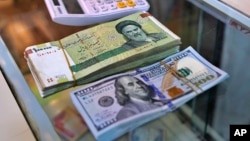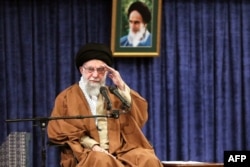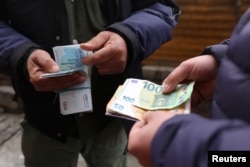Public outrage is mounting in Iran as the country's struggling economy worsens under crippling U.S. sanctions.
The national currency plunged to a record low on February 11 soon after U.S. President Donald Trump ordered the restart of a "maximum pressure" campaign on the Islamic republic.
In response, Supreme Leader Ayatollah Ali Khamenei appeared to dismiss the prospect of negotiations with the United States over Iran's disputed nuclear program.
A nuclear deal is seen as key to Washington lifting economic sanctions on Iran, which has witnessed rising unemployment and growing poverty in recent years.
Quick Turnabout
For months, Iranian officials have signaled the country was open to negotiating with Trump.
That is despite Trump withdrawing the United States from a nuclear deal between Tehran and world powers and reimposing sanctions during his first term in office. In response, Tehran significantly expanded its nuclear program, though it maintains it is not looking to weaponize it.
Khamenei on January 28 appeared to give his blessing to talks with Trump, saying it's "possible to make a deal" with someone you know and can prepare for.
But the Iranian leader changed tack on February 7, saying it would "not be intelligent, wise, or honorable" to negotiate with Washington because it cannot be trusted.
"A portion of society pinned their hopes" on reformist President Masud Pezeshkian, who was elected in 2024, said Saeed Peyvandi, a professor of sociology at Paris 13 University.
"Now they will see their lives getting worse," Peyvandi told RFE/RL's Radio Farda. "This will make the prospects of change in the [Islamic republic] impossible in the eyes of the people…. An angry and hungry society can take to the streets at any moment."
There have been violent protests in recent years over Iran's freefalling economy.
Frustration And Criticism
Khamenei's apparent rejection of negotiations with the United States has led to an outpouring of frustration and criticism on social media.
Some Iranians on X asked why an "unelected, lifelong official" gets to decide what is best for an entire nation.
Others called on Pezeshkian to resign if he was unable to deliver on his campaign pledge to ease tensions with the West.
Khamenei's comments as well as Trump's decision to resume a "maximum pressure" campaign on Iran appeared to trigger the sudden drop of the value of the rial against the U.S. dollar.
The falling value of the rial in recent years has exacerbated the cost of living in Iran. A recent report by Iran's statistical authority said that around a third of Iranians earn less than $2 a day and struggle to afford basic necessities.
Economy journalist Zohreh Irani pointed to the depreciation of the rial and declared, "You will negotiate, I promise you."
Joking about the speed with which the rial is falling, Iranian poet Morteza Lotfi wrote on X, "We worked 9 hours today but we're poorer than the morning!"
Ata Mohamed Tabriz, a political analyst based in Turkey, told Radio Farda that Iranians have expressed "serious anger" since Khamenei's comments.
"There is a chance the anger will grow…. But it doesn't look like the Islamic republic is going to do anything about it," he added.












